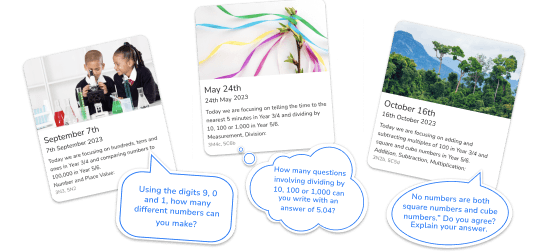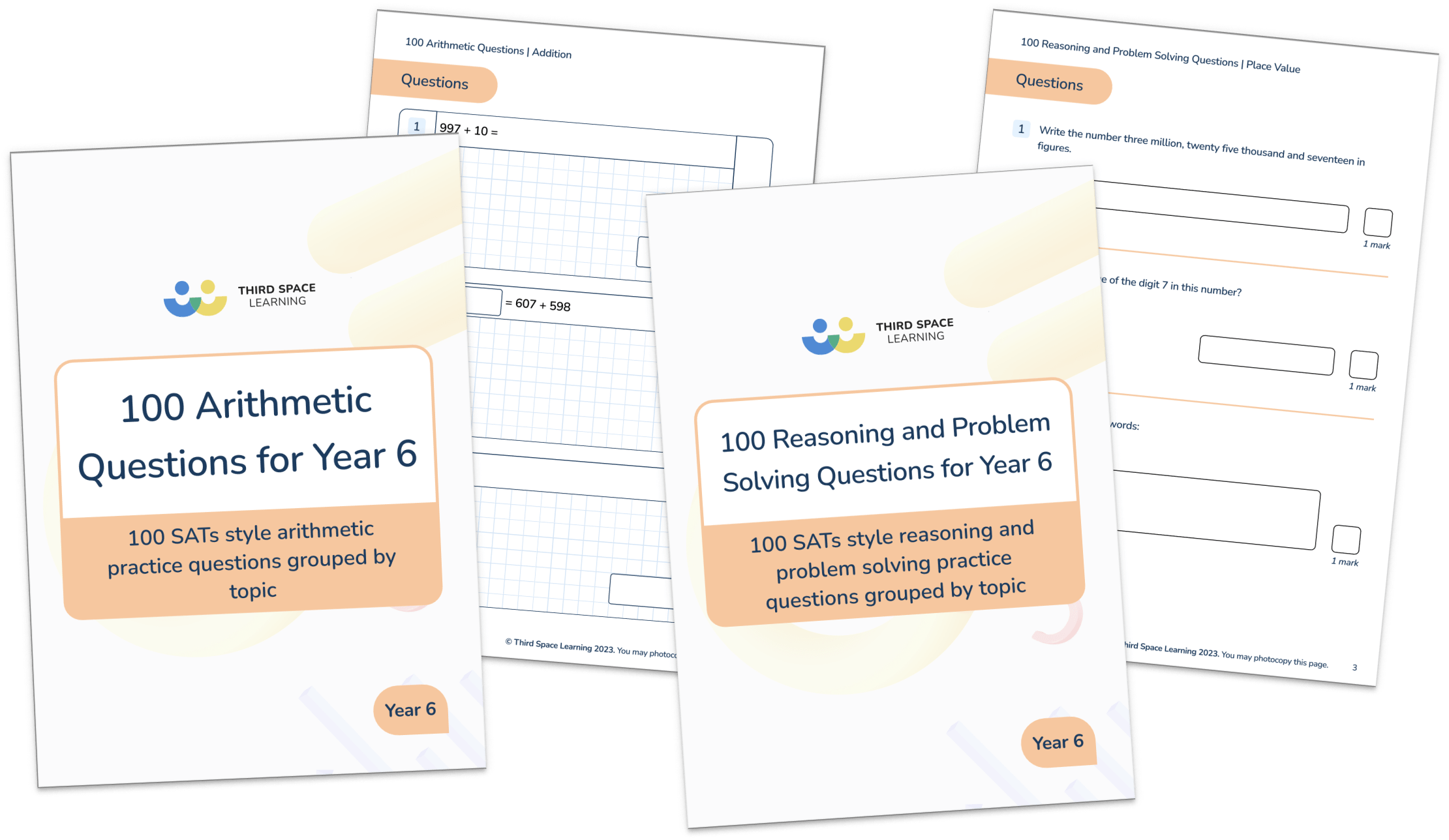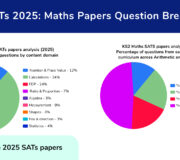Year 6 Arithmetic Questions: 36 SATs-Style Questions and Answers
Secure understanding of Year 6 arithmetic questions is the biggest factor in determining success in the Key Stage 2 SATS tests. Particularly for pupils on the cusp of meeting age related expectations in maths.
Arguably, the nature of the questions makes the arithmetic paper the easiest of the three test papers to prepare children for. To help pupils gain as many marks as possible in their KS2 SATs, it is worth spending time ensuring pupils are confident with the required arithmetic skills.
In this article, we’ll discuss how best to prepare for the arithmetic paper. Additionally, we look at the types of questions pupils are likely to face in the KS2 maths SATs and why practising arithmetic questions as part of pupils’ SATS revision is good preparation.
To support SATs preparations, here you’ll find a collection of 36 arithmetic questions and correct answers. These cover the most common areas of calculations, fractions, decimals and percentages.
What are Year 6 arithmetic questions?
Year 6 arithmetic questions are sets of questions designed to assess the mathematical skills of students aged 10-11. These questions cover the mathematical content students learn in their final year of primary education.
Arithmetic questions cover a range of Year 6 mathematical concepts including:
- addition
- subtraction
- multiplication
- division
- fractions
- percentages
- decimals
Why do teachers need a bank of Year 6 arithmetic questions?
Having a bank of arithmetic questions is valuable for any teacher, no matter how experienced, when preparing children for the KS2 SATs arithmetic test.
A bumper pack of arithmetic questions that can be used at any time can help to:
- Assess pupil progress: Practising a range of arithmetic questions enables the teacher and pupils to monitor progress. Highlighting any learning gaps enables teachers to focus on these particular areas of arithmetic.
- Close learning gaps: Regular arithmetic practice helps to reinforce concepts and address pupils’ misconceptions.
- Boost confidence: As pupils become more familiar with the types and style of questions, they can answer them more quickly. In turn, this builds confidence when completing the official arithmetic SATs paper.
- Reduce test anxiety: Exposure and regular practice of arithmetic questions can help to reduce pupil anxiety around SATs. A larger bank of arithmetic questions helps expose pupils to more types of questions. This helps questions become more predictable.
- Build familiarity with the test: Practising arithmetic questions similar to those in the SATs tests under times conditions helps pupils become familiar with the structure of the paper. Also with the time available to tackle the types of questions in the arithmetic paper.

Unlimited primary maths tutoring with Skye, the voice-based AI maths tutor.
Built on the same principles, pedagogy and curriculum as our traditional tutoring, but with more flexibility, reach and lower cost.
Join the schools already helping hundreds of primary pupils nationwide with Skye’s one to one maths tutoring.
Watch Skye in actionKS2 arithmetic questions: what you need to know
Understanding the arithmetic test instructions and types of questions is important for teachers and Year 6 children alike. It helps give pupils the best possible chance of achieving age related expectations in maths at the end of KS2.
If children are familiar with the structure of the paper, the types of questions and the way marks are awarded, they should be confident when it comes to SATs.
Typically, the arithmetic paper follows a very similar structure and format each year. Questions predominantly focus on two content domains:
- Calculations
- Fractions (including improper fractions and mixed numbers), decimals and percentages
These two domains account for between 75% and 85% of the arithmetic paper each year. Only a small proportion of questions fall outside of these domains.
Confidence in these areas is key in ensuring success in the maths SATS.

Number of arithmetic questions by content domain in the KS2 arithmetic SATs paper
Questions in the arithmetic paper test pupils’ place value and fluency skills. There is limited variation on the structure and format of these questions.
Of the three papers, arithmetic is the most straight forward to prepare children for. It is worth spending a considerable amount of time working through these types of questions, to ensure children are as confident and prepared as they can be.
Arithmetic questions typically follow a few formats:
- A number sentence followed the answer:
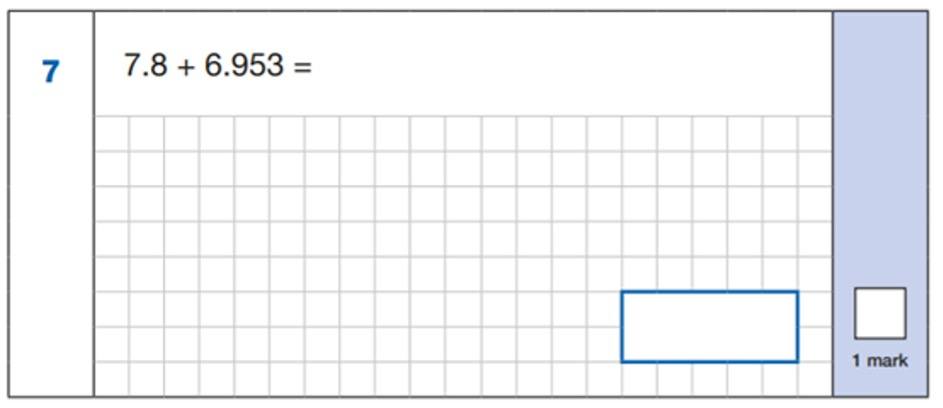
Arithmetic question 7, 2023
- Number sentences with the answer given but part of the question missing:
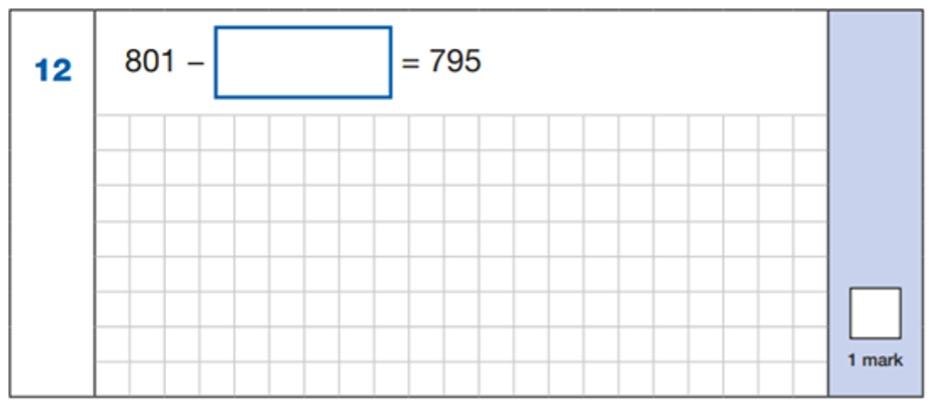
Arithmetic question 12, 2023
- Number sentences with the answer box at the start of the question:
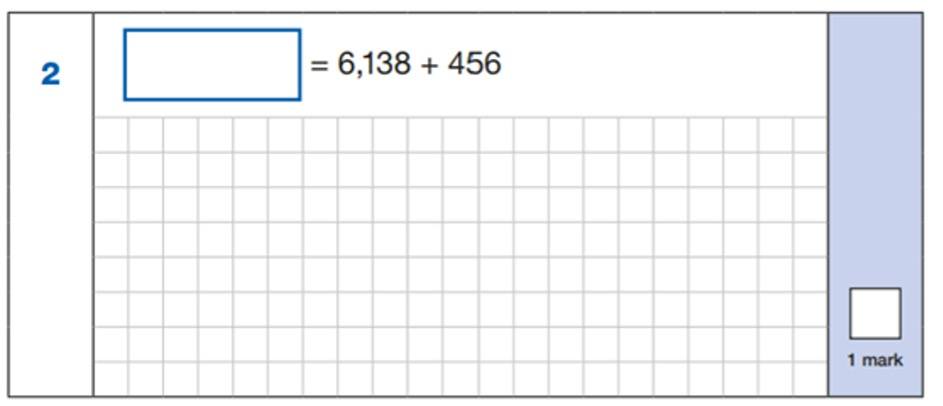
Arithmetic question 2, 2023
Although the types of questions are similar throughout the arithmetic paper, they increase in difficulty as the paper progresses.
For example, the fractions questions and percentages questions below are very similar but more difficult on each appearance.

Similar arithmetic questions may be presented in more than one way. Here, the first example fractions question is presented in a way pupils are familiar with.
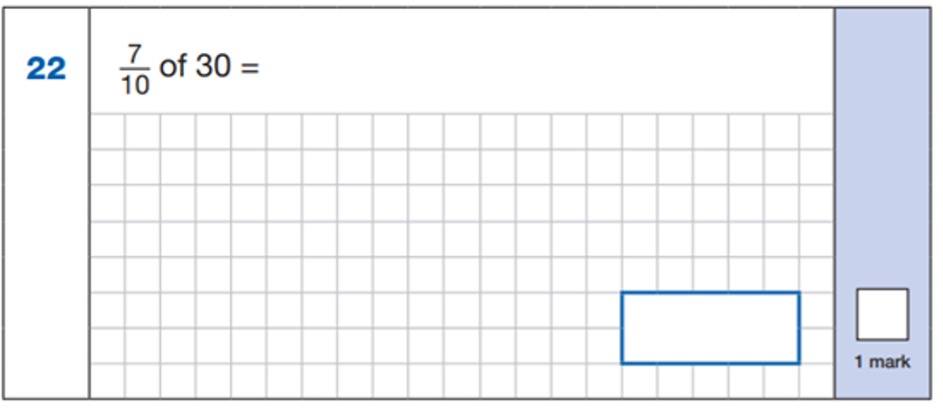
Arithmetic question 22, 2023
This type of question may confuse children who have not been exposed to fractions of amounts questions presented in this way.
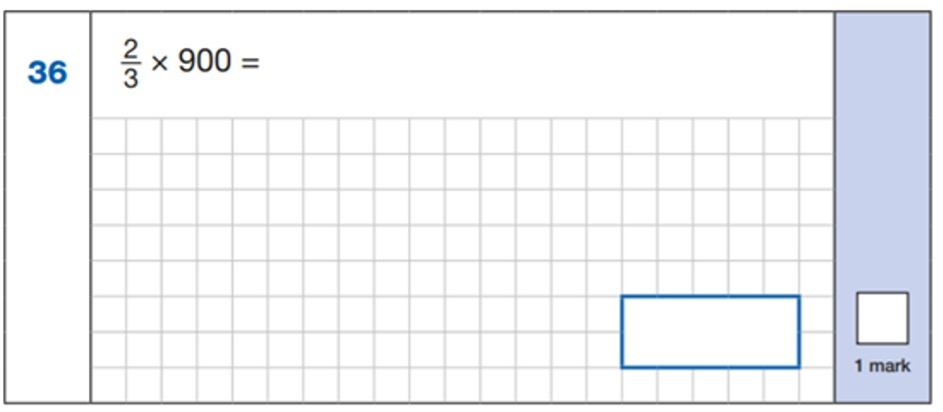
Arithmetic question 36, 2023
Pupils are also exposed to the formal written method in the arithmetic paper for long multiplication and long division:
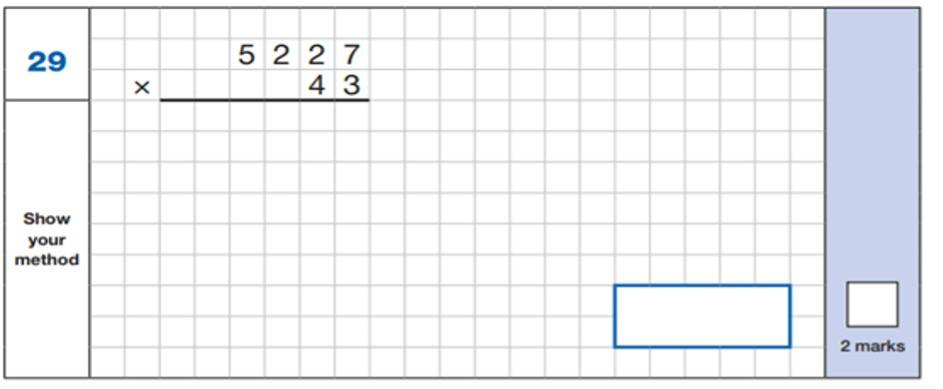
Arithmetic question 29, 2023
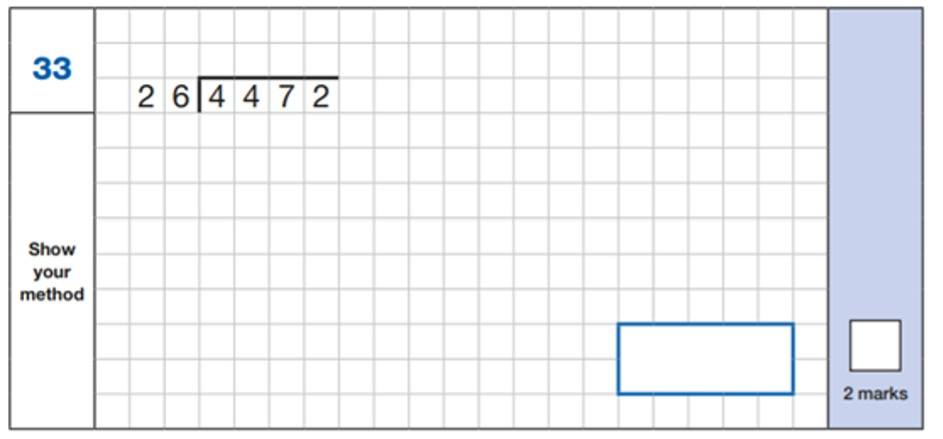
Arithmetic question 33, 2023
Why is it important to practise arithmetic test questions in Year 6?
Great arithmetic skills are key for KS2 SATs, they are the easiest marks to pick up across the three papers.
In 2023 pupils needed a total score of 56 marks across the three papers to reach the expected standard. So, the more marks pupils can achieve out of the 40 marks on the arithmetic paper the better their chances of achieving the age related standard.
Timed practice of SATs questions means children will be prepared for the structure of the arithmetic paper and have the confidence to complete it accurately.
Below, there are 36 arithmetic questions designed to recap the key domains within the arithmetic paper: four operations, fractions, decimals and percentages.
To mimic the KS2 SATs arithmetic paper, the questions become progressively harder. This helps children to develop fluency within the topic.
Third Space Learning offers an extensive range of SATs practice resources. Our math experts have developed hundreds of SATs arithmetic questions to help pupils develop the skills and confidence they need to approach their KS2 assessments. Download the KS2 Maths SATs Arithmetic Practice Paper Pack 1 and Pack 2 to help develop your pupils arithmetic skills.
What Year 6 arithmetic questions are included in this pack?
The four operations: addition, subtraction, multiplication and division, and fractions, decimals and percentages make up over 75% of the KS2 arithmetic test.
Questions in this arithmetic pack reflect the structure of the arithmetic paper. They will focus on these key areas of the national curriculum, to prepare pupils for the end of KS2 SATS.
200 arithmetic and reasoning questions for Year 6
Download 100 free arithmetic questions and 100 free reasoning questions for Year 6. Includes answers and mark scheme.
Download Free Now!36 Year 6 Arithmetic Questions – SATs-Style
Addition
Arithmetic question 1
792 + 10 =
Answer: 802
Arithmetic question 2
67 + 486 =
Answer: 553
Arithmetic question 3
____ = 6584 + 7497
Answer: 14,081
Arithmetic question 4
58,636 + _______ = 93,472
Answer: 152,108
Arithmetic question 5
_______ + 356.92 = 938.52
Answer: 581.6
Read More: Teaching Addition and Subtraction KS2: A Guide For Primary School Teachers From Year 3 To Year 6
Subtraction
Arithmetic question 6
803 – 10 =
Answer: 793
Arithmetic question 7
623 – 78 =
Answer: 545
Arithmetic question 8
_______ = 8516 – 3728
Answer: 4,788
Arithmetic question 9
84,351 – __________ = 46,383
Answer: 37,968
Arithmetic question 10
______ – 286.4 = 460.45
Answer: 746.85
More Questions: Year 6 addition and subtraction questions for SATs
Multiplication
Arithmetic question 11
439 x 10 =
Answer: 4,390
Arithmetic question12
3 x 6 x 40 =
Answer: 720
Arithmetic question 13
7 x 658 =
Answer: 4,606
Arithmetic question 14
473 x 56 =
Answer: 26,488
Arithmetic question 15
64 x 7.3 =
Answer: 467.2
Read More: The Long Multiplication Method: How To Teach Long Multiplication So All Your KS2 Pupils ‘Get It’
Division
Arithmetic question 16
863 ÷ 10 =
Answer: 86.3
Arithmetic question 17
______= 438 ÷ 3
Answer: 146
Arithmetic question 18
63.8 ÷ 100 =
Answer: 0.638
Arithmetic question 19
7536 ÷ 12 =
Answer: 628
Arithmetic question 20
7,584 ÷ 24 =
Answer: 316
Arithmetic question 21
9,912 ÷ 59 =
Answer: 168
Read More: How To Teach The Formal Long Division Method At KS2 Step By Step So Children Love It!
Fractions
Arithmetic question 22
\frac{11}{12} – \frac{1}{6} =
Answer: \frac{9}{12} = \frac{3}{4}
Arithmetic question 23
\frac{3}{8} + \frac{1}{4} + \frac{3=9}{16} =
Answer: 1 \frac{3}{16}
\frac{6}{16} + \frac{4}{16} + \frac{9}{16} = \frac{19}{16} = 1 \frac{3}{16}
Arithmetic question 24
\frac{3}{8} of 128 =
Answer: 48
Arithmetic question 25
\frac{3}{4} x \frac{5}{8} =
Answer: \frac{15}{32}
Arithmetic question 26
\frac{3}{7} ÷ 4 =
Answer: \frac{3}{28}
Read More: Teaching Fractions KS2: A Guide For Primary School Teachers From Year 3 To Year 6
Percentages
Arithmetic question 27
10% of 970 =
Answer: 97
Arithmetic question 28
5% of 460 =
Answer: 23
Arithmetic question 29
30% of 6450 =
Answer: 1,935
Arithmetic question 30
15% of 8642 =
Answer: 1296.3
10% = 864.2, 5% = 432.1, 15% = 1296.3
Arithmetic question 31
37% of 8700
Answer: 3,219
10% = 870, 30% = 2,610, 5% = 435, 1% = 87
Read More: Teaching Percentages KS2: A Guide For Primary School Teachers From Year 3 To Year 6
Decimals
Arithmetic question 32
6.7 + 5.836 =
Answer: 12,536
Arithmetic question 33
952.3 – 48.96 =
Answer: 903.34
Arithmetic question 34
747.78 – ______ = 378.83
Answer: 368.95
Arithmetic question 35
6.72 x 15 =
Answer: 100.8
Arithmetic question 36
2568.4 ÷ 4 =
Answer: 642.1
Read More: Teaching Decimals KS2: A Guide For Primary School Teachers From Year 4 To Year 6
More SATs worksheets and answer sheets
- Fluent in Five Weeks 1-6
- 100 arithmetic questions for year 6
- Best Year 6 SATs practice papers
- 6 KS2 maths SATs practice papers
- Past SATs papers
- Year 6 maths test
- Year 6 algebra questions
- Year 6 ratio questions
FAQs
The year 6 arithmetic test lasts for 30 minutes and has a total of 40 marks, made up of predominantly 1 mark questions, with some 2 mark questions.
Typically, the arithmetic paper contsists of 36 questions usually make up of 32 1-mark and 4 2-mark questions.
Over the past five years, the raw score pupils need to achieve to be considered as working at the expected standard in the maths SATS has ranged between 56 and 61 marks (53-55%).
To achieve this percentage in the arithmetic paper, pupils need to score 21 marks or above.
However, with this being the most straight forward of the three papers, children need to aim higher on the arithmetic paper to achieve a percentage of 53-55% over all.
DO YOU HAVE STUDENTS WHO NEED MORE SUPPORT IN MATHS?
Skye – our AI maths tutor built by teachers – gives students personalised one-to-one lessons that address learning gaps and build confidence.
Since 2013 we’ve taught over 2 million hours of maths lessons to more than 170,000 students to help them become fluent, able mathematicians.
Explore our AI maths tutoring or find out about primary maths tutoring for your school.


